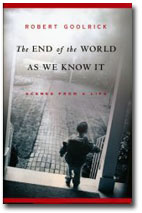Books |
The End of the World As We Know It
Robert Goolrick
By
Published: Jan 01, 2007
Category:
Memoir
Maybe you read The New York Times article about the badly wounded Iraq vet who tried to kill himself seventeen times after he came home. It wasn’t what he saw in Iraq that made his cup of self-loathing overflow. And it wasn’t the loss of his leg and eyesight. “He had a rough life from the time he was born,” his grandfather said. “When that kid was little, the way he got beat around, it was awful.”
There are all kinds of beatings. Among the “better” classes, belts and fists are unthinkable. The weapon of choice is generally words, but it can veer into sexual abuse. And the damage is generally to a child’s self-esteem and sense of safety.
The worst thing about these assaults? The parents “know better.” Indeed, if they heard about a neighbor’s child being verbally or sexually abused, they’d be shocked. Who knows? They might even intervene.
So why are these parents blind to their own cruelty?
They’re drunk.
“My father died because he drank too much.” That’s the first sentence of Robert Goolrick’s memoir. The second? “Six years before, my mother had died because she drank too much.” The third? “I drank too much.”
If you drink, if you are the child of a drunk or have drunks among your family and friends, this is not shocking news to you — alcohol is a kind of misery that seems to love company.
But even if drunks are your lot, I doubt you know the kind of depravity that Goolrick describes here. “My mother and father presented a perfect picture to the world, a happy, witty, charming young couple who were madly in love, and did nothing but have fun,” he writes. And so it was. His father was Virginia gentry, a college history professor. His mother was a beauty, well-read, a lady; she wore powder and gloves. At the Goolricks’ cocktail parties, they served cheese straws and cucumber sandwiches, and the guests laughed heartily at their stories.
And his father ended up with rats cavorting on the Persian carpets.
“Somebody once said to me that all families were either about the parents or about the children,” Goolrick notes. “Ours was about their parents.” And yet, through the first half of this memoir, the dominant note is forgiveness. Alone of the three Goolrick children, Robert got nothing from his parents. He won fellowships to pay his way through school, where he compiled a brilliant record; they didn’t seem to notice. He paid for their house; they never thanked him.
Why does Goolrick forgive these wretched, thoughtless, insufferable people?
Because, when he was four years old, something happened.
I’m not going to say what it was — Goolrick artfully structures this taut (213 pages), unsettlingly elegant book so you’re well into the home stretch before he reveals the awful deed — but its effect is devastating. That is, it’s the defining event of Goolrick’s life. It leads to drugs and cutting and suicide attempts and desperate sex — all the stations of the self-loathing cross.
The title of this book is ironic. In the song, the lyrics go: “It’s the end of the world as we know it/And I feel fine.” But at no point in these pages — not even at the end — does Robert Goolrick feel fine. For whatever reason, he is unable to get past the damage his parents inflicted — and then ignored. Given that, the writing of this book is a Herculean achievement.
So why push this sad, ugly story on you?
Because you are a drunk, and maybe my words will get you to read this book, and this book will stop you cold and make you realize not only what you are doing to yourself but the spectacular damage you are committing on your loved ones — especially your kids.
Because you have a drunk in your family or social circle, and you’ve been pretending it’s not really so great a problem, because God forbid you should do something uncomfortable and intervene — well, maybe this book will be your wake-up call.
Or because you are the child of a drunk and you have been victimized in ways you can barely admit to yourself, much less share with others. Because you need help and won’t get it because, in the twisted logic of these things, you’re convinced that what happened to you is your fault, and deserved. Because, in the end, you feel so alone it’s a victory every time you get through the day.
Robert Goolrick’s among the walking wounded. But against all odds, he’s walking. In his garbage dump of a life, that’s a flower. And for others who see only “a veil of human misery over everything,” that should be inspiring.
To buy “The End of the World As We Know It” from Amazon.com, click here.


